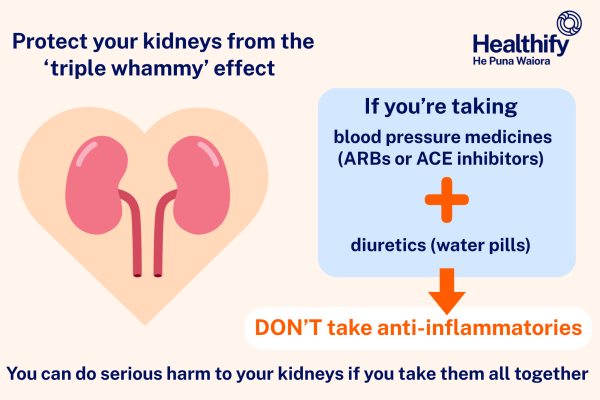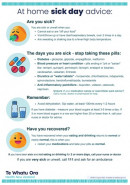If you're a frequent visitor to Healthify, why not share our site with a friend? Don't forget you can also browse Healthify without using your phone data.
Diclofenac
Sounds like 'dye-kloe-fen-ak'
Key points about diclofenac
- Diclofenac is an anti-inflammatory used to treat pain and inflammation.
- Diclofenac is also called Voltaren®, Diclohexal® or Apo-Diclo SR®.
- Find out how to take it safely and possible side effects.

Diclofenac is in a group of medicines known as non-steroidal anti-inflammatory drugs (NSAIDs).
It's used to treat different types of pain such as dental pain, period pain, bursitis, migraine and pain resulting from injury or after surgery.
NSAIDs are also used to ease pain, swelling and stiffness associated with flare-ups of gout, osteoarthritis, rheumatoid arthritis and ankylosing spondylitis.
NSAIDs work by blocking the inflammation process in your body.
In Aotearoa New Zealand, diclofenac comes as tablets, dispersible (dissolvable) tablets, suppositories and an injection.
- Tablets come as immediate release and slow release (SR).
- The immediate release tablets are useful where immediate pain relief is required, and the slow release is more useful in reducing long-term inflammation.
- The suppositories are useful when tablets aren't suitable, eg, for migraines with vomiting. Learn more about suppositories.
Lower strengths of diclofenac tablets and capsules (Voltaren Rapid®) can be bought from a pharmacy without a prescription.
- Dose: The dose of diclofenac will be different for different people depending on its use.
- Immediate release tablets: The usual dose is 25 to 50 mg, 3 times a day.
- Slow release tablets: The usual dose is 75 to 150 mg per day in 1 or 2 divided doses.
- Duration: You usually only need to take diclofenac for a short time, just while you have pain and swelling.
Tablets and capsules
- Swallow the tablets and capsules whole with a glass of water.
- Don't crush or chew them.
- If diclofenac gives you a sore stomach, take it with or soon after food.
Dispersible tablets
- Dissolve the tablet in some water. Stir if necessary.
- After taking, rinse the container with water and drink this to ensure all the diclofenac dose is swallowed.
- If diclofenac gives you a sore stomach, take it with or soon after food.
Missed dose
- If you forget to take a dose, take it when you next need pain relief and then continue as before. Don't take 2 doses together to make up for a missed dose.
Diclofenac is safe for most people, Extra care is needed in some situations, such as if:
- you have high blood pressure
- you have heart or kidney problems or asthma
- you're 65 years of age or older
- you smoke.
It can also be harmful if you take diclofenac when you're dehydrated or have been sick with diarrhoea (runny poos) or vomiting (being sick). Read more about the risks of NSAIDs.
Diclofenac should NOT be used in some situations as it can be harmful. For example you shouldn't take diclofenac if you:
- have current or previous stomach problems such as ulcers or bleeding
- are pregnant
- have heart failure or chest pain (angina)
- have had a stroke or heart attack
- have chronic kidney disease
- have had an allergic reaction (such as hives or trouble breathing) to ibuprofen, aspirin, or other similar medications (discuss with your healthcare provider)
- are taking medicines to reduce blood clots (anticoagulants) such as warfarin, dabigatran or rivaroxaban
- are also taking other anti-inflammatory medicines, eg, ibuprofen, diclofenac (Volatren), naproxen (Naprosyn®) or celecoxib (Celebrex)
- are taking some blood pressure medicines such as ACE inhibitors, ARBs, diuretics – always check with your healthcare provider before taking NSAIDs.
Taking diclofenac with other pain medicines
Don't take other anti-inflammatory medicines such as ibuprofen, naproxen or celecoxib while you're taking diclofenac.
It's safe to take diclofenac with paracetamol because they work differently.
Taking diclofenac with blood pressure medicines
Diclofenac interacts with some medicines, especially those used for high blood pressure, so check with your healthcare provider or pharmacist before you start taking diclofenac.
Image credit: Healthify He Puna Waiora
Taking NSAIDs, such as diclofenac, together with blood pressure medicines can be harmful to your kidneys. This is called the ‘triple whammy’. If you're taking blood pressure medicines (ACE inhibitors or ARBs) and diuretics tell your doctor or pharmacist before starting diclofenac. Talk to them about safe pain-relief options for you.
- Examples of ACE inhibitors are captopril, cilazapril, enalapril, lisinopril, perindopril and quinapril.
- Examples of ARBs are candesartan, irbesartan and losartan.
- Examples of diuretics are furosemide, bumetanide, bendroflumethiazide, chlortalidone, hydrochlorothiazide, indapamide, spironolactone, eplerenone and metolazone.
Read more about the triple whammy effect.
Some other things to know when you're taking diclofenac
- Stay hydrated: Drink plenty of water to protect your kidneys.
- Alcohol: Diclofenac doesn't directly interact with alcohol. This means that most people could have the occasional drink while taking it without any serious problems. However, if diclofenac makes you feel dizzy or gives you a sore stomach, don't drink alcohol as it will make you feel worse.
- Driving: Diclofenac can make you feel dizzy. Be careful when driving or using tools until you know how this medicine affects you.
- Pregnancy and breastfeeding: Talk to your healthcare provider if you're pregnant, planning a pregnancy or want to breastfeed.
Like all medicines, diclofenac can cause side effects, although not everyone gets them. If you're concerned about any symptoms you think might be related to your medicine, talk to your healthcare provider. The information below offers some guidance but doesn’t include all possible side effects.
Common side effects
Tell your healthcare provider if these side effects bother you.
- Heartburn (indigestion), sore stomach, runny poo (diarrhoea). Take diclofenac with food.
- Headache.
- Feeling dizzy. Don’t drink alcohol. Be careful when driving or using tools until you feel better.
Tell your healthcare provider immediately or phone Healthline free on 0800 611 116 if these occur
- Serious stomach problems such as really bad stomach pain, blood in your stool or black stools, cough or vomiting up blood or dark-coloured vomit
- Chest pain, shortness of breath or trouble breathing
- Signs of a stroke such as weakness in one part or side of your body and slurred speech
- Signs of kidney problems such as swollen ankles, blood in your pee or not peeing at all.
Phone 111 for an ambulance or go to your nearest accident and emergency (A&E) clinic if these occur
- Signs of an allergic reaction such as itchy skin, and rash, swollen lips or tongue, problems breathing, such as a tight chest or shortness of breath.
Read more about medicines and side effects and reporting a reaction you think might be a side effect.
The following links have more information on diclofenac:
Diclofenac(external link) NZ Formulary Patient Information te reo Māori(external link)
Votaren 50 mg, 75 mg SR, 50 mg dispersible tablets(external link) Medsafe Consumer Medicine Information, NZ
Diclofenac Sandoz®(external link) Medsafe Consumer Medicine Information, NZ
Brochures
Medicines and side effects(external link) Healthify He Puna Waiora, NZ, 2024
At home sick day advice [PDF, 425 KB](external link) Health New Zealand | Te Whatu Ora, 2023
5 questions to ask about your medications(external link) Health Quality and Safety Commission, NZ, 2019 English(external link), te reo Māori(external link)
References
- Diclofenac sodium (systemic)(external link) New Zealand Formulary
- Diclofenac potassium(external link) New Zealand Formulary
- Voltaren SR 75 mg tablet(external link) Medsafe datasheet, NZ
- Voltaren Rapid Extra Strength(external link) Medsafe datasheet, NZ
- Diclofenac Sandoz(external link) Medsafe datasheet, NZ
-
Avoiding the triple whammy in primary care – ACE inhibitor/ARB + diuretic + NSAID(external link) BPAC, NZ, 2018
Brochures

Medicines and side effects
Healthify He Puna Waiora, NZ, 2024

At home sick day advice
Health New Zealand | Te Whatu Ora, 2023

Health Quality and Safety Commission, NZ, 2019 English, te reo Māori
Credits: Healthify editorial team. Healthify is brought to you by Health Navigator Charitable Trust.
Reviewed by: Stephanie Yee, Pharmacist, Auckland.
Last reviewed:





